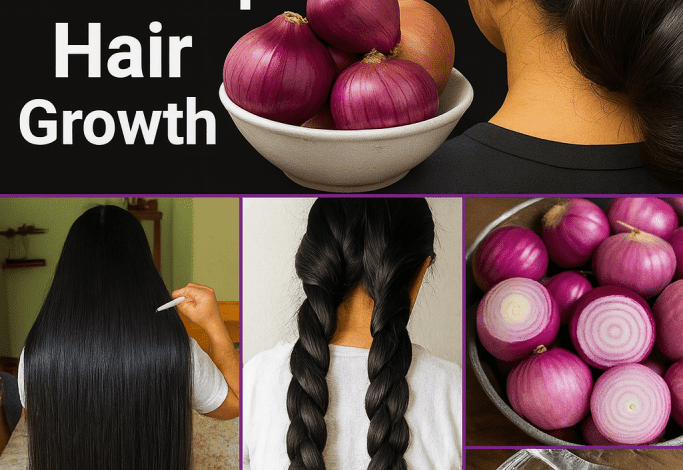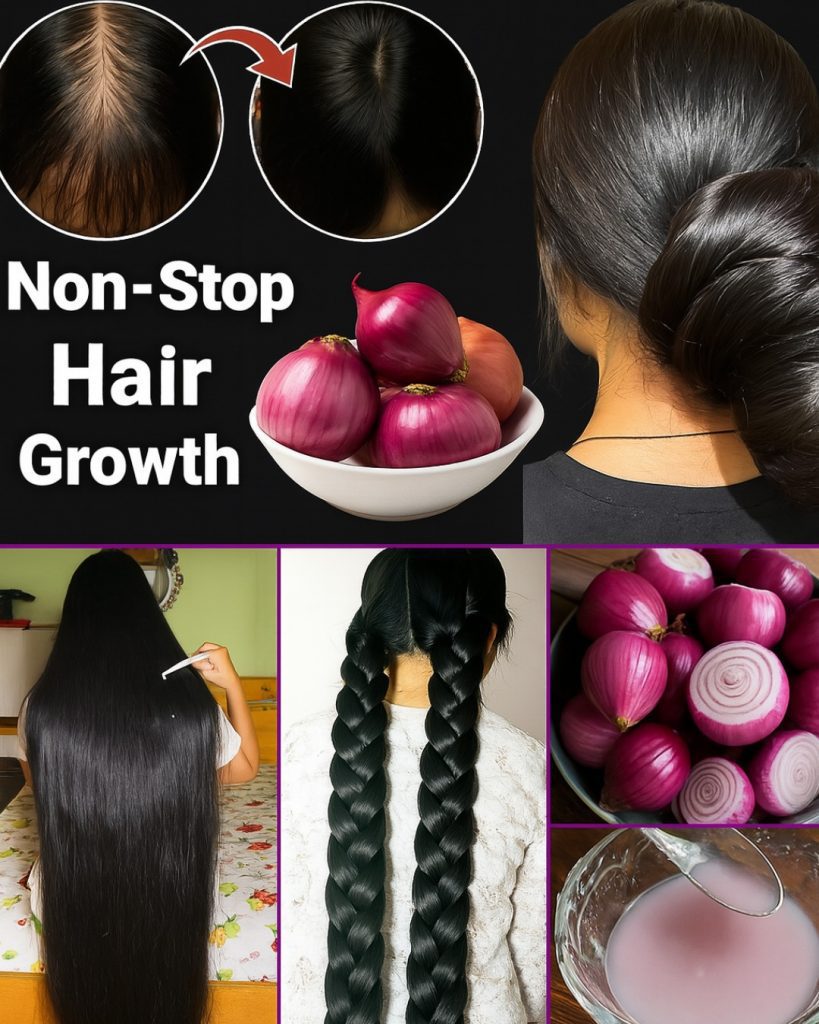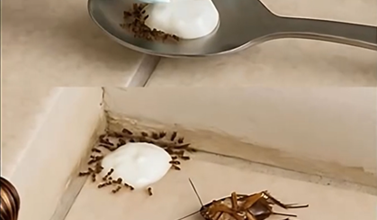
How to Make Onion Hair Oil for Stronger, Thicker Hair Naturally
Hair fall can feel like a personal betrayal—watching strands slip away in the shower or cling to your brush is disheartening. You’re not alone in this struggle, and the good news? A simple, natural remedy like onion hair oil could be your ticket to healthier, stronger hair. Used for centuries in traditional practices, this budget-friendly solution is backed by emerging science and easy to whip up at home. Ready to transform your hair care routine? Let’s dive into why onion hair oil works, how to make it, and the steps to use it effectively for faster hair growth and less hair fall. 🌿
Why Onions? Unpacking the Science Behind the Smell
Onions might not scream “luxury haircare,” but their nutrient-packed profile makes them a surprising hero for your scalp. Rich in sulfur, antioxidants, and quercetin, onions deliver a powerful punch to nourish hair follicles and promote scalp health. A 2002 study in the Journal of Dermatology found that participants applying onion juice twice daily saw visible hair regrowth in just two weeks, with significant improvements after six weeks.
Here’s why onions are a game-changer for your hair:
- Sulfur compounds strengthen hair strands, reducing breakage.
- Antioxidants fight scalp inflammation and oxidative stress.
- Antibacterial properties keep infections and dandruff at bay.
- Improved circulation stimulates dormant hair follicles, encouraging growth.
Yes, the smell can be intense, but the results? Worth it. Let’s explore how to make this potent elixir in your own kitchen.
Step-by-Step: Crafting Your Own Onion Hair Oil
Making onion hair oil is quick, affordable, and free from the synthetic additives found in commercial products. With just a few ingredients and 30 minutes, you’ll have a natural remedy tailored to your hair’s needs. Here’s the process:
Ingredients You’ll Need
- 1 medium red or yellow onion (peeled, finely chopped or grated for maximum juice release).
- 1/2 cup coconut or castor oil (or a 50/50 blend for extra nourishment).
- Optional: 5–7 curry leaves, or 3–5 drops of rosemary or lavender essential oil for added benefits and a softer scent.
Instructions
- Heat the oil: Pour your chosen oil into a small pan and warm it over low to medium heat. Avoid high heat to preserve nutrients.
- Add onions: Stir in the chopped or grated onion, ensuring it’s fully submerged.
- Incorporate extras: If using curry leaves or herbs, add them now for additional hair-strengthening properties.
- Simmer gently: Let the mixture cook for 10–12 minutes, stirring occasionally, until the onions turn golden-brown and the oil smells aromatic.
- Cool it down: Remove from heat and let the oil cool completely to room temperature.
- Strain and store: Use a fine strainer or cheesecloth to filter the oil into a clean glass jar or bottle. Store in a cool, dry place for up to 2–3 weeks.
Pro Tip: Use a dark glass container to protect the oil from light and extend its shelf life. ✅
How to Use Onion Hair Oil for Maximum Results
Applying onion hair oil correctly is key to unlocking its benefits. Follow these steps to ensure your scalp and hair soak up all the goodness:
- Massage it in: Take 1–2 tablespoons of onion hair oil and gently massage it into your scalp using circular motions for 5–10 minutes. This boosts blood flow to hair follicles.
- Spread it out: Work the oil through the length of your hair, focusing on dry or damaged ends.
- Let it sit: Leave the oil on for at least 30 minutes. For deeper nourishment, wrap your hair in a warm towel or leave it on overnight.
- Rinse thoroughly: Wash with a mild, sulfate-free shampoo. Double-cleansing may be needed to remove the onion scent.
- Repeat regularly: Use 2–3 times per week for noticeable results over 4–8 weeks.
Tips for Sensitive Scalps
- Patch test first: Apply a small amount behind your ear or on your inner arm and wait 24 hours to check for irritation.
- Tame the smell: Add a few drops of lavender or tea tree essential oil to mask the onion odor.
- Choose quality oils: Opt for cold-pressed, organic coconut or castor oil to ensure purity and nutrient density.
What to Expect: Benefits of Onion Hair Oil
With consistent use, onion hair oil can work wonders for your hair and scalp. Paired with a healthy lifestyle, you might notice:
- Less hair fall: Fewer strands in your brush or shower drain.
- Shinier, softer hair: Improved texture and natural luster.
- Healthier scalp: Reduced flaking, itching, or irritation.
- Stronger strands: Less breakage and improved thickness.
- New growth: Potential regrowth in thinning areas, especially with regular use.
Results won’t happen overnight, but after 4–6 weeks of consistent application, you’ll likely see a difference. Patience is your best friend here! 🌱
Let’s keep expectations realistic. While onion hair oil is promising, it’s not a miracle cure. Here’s what to know:
-
- No instant fixes: Visible results take weeks of consistent use.
- Not a medical treatment: It won’t address severe hair loss caused by conditions like alopecia, hormonal imbalances, or scalp infections. Consult a dermatologist for these concerns.
- Results vary: Factors like genetics, diet, and overall health influence outcomes.
For serious hair loss, onion oil can complement—but not replace—professional advice.
Supercharge Your Results with These Hair-Healthy Habits
Onion hair oil works best when paired with a holistic approach to hair care. Boost its effects with these habits:
-
- Eat nutrient-rich foods: Prioritize protein (eggs, lentils), iron (spinach, red meat), biotin (nuts, bananas), and healthy fats (avocado, salmon).
- Stay hydrated: Drink at least 8 glasses of water daily to support scalp health.
- Limit heat styling: Avoid excessive blow-drying or flat-ironing to prevent damage.
- Sleep on silk: Use a silk pillowcase to reduce friction and breakage.
- Manage stress: Practice yoga, meditation, or light exercise to lower cortisol, which can contribute to hair loss.

Common Questions About Onion Hair Oil
Does the Smell Linger?
The onion scent can be strong, but thorough shampooing removes it. Adding essential oils like rosemary or lavender during preparation helps, too.
Can I Use It Daily?
Daily use might be too much for some scalps, especially if sensitive. Stick to 2–3 times per week to avoid irritation.
Will It Work for Everyone?
Results depend on individual factors like hair type, scalp condition, and underlying causes of hair loss. Consistency is key, but consult a professional if you see no improvement after 8 weeks.
Final Thoughts: Your Path to Healthier Hair
Onion hair oil may not have the glamour of high-end salon products, but its natural, science-backed benefits make it a worthy addition to your routine. For the cost of a single onion and some pantry staples, you can create a remedy that fights hair fall, nourishes your scalp, and promotes stronger, thicker hair—all without harsh chemicals.
Ready to give it a try? Your best hair days could be just a few onions away. Share this recipe with a friend or save it for your next self-care session. Here’s to healthier, happier hair—naturally!
Disclaimer: This article is for informational purposes only and does not replace professional medical advice. Always consult a dermatologist or healthcare provider before trying new hair or scalp treatments, especially if you have sensitive skin or medical conditions.




